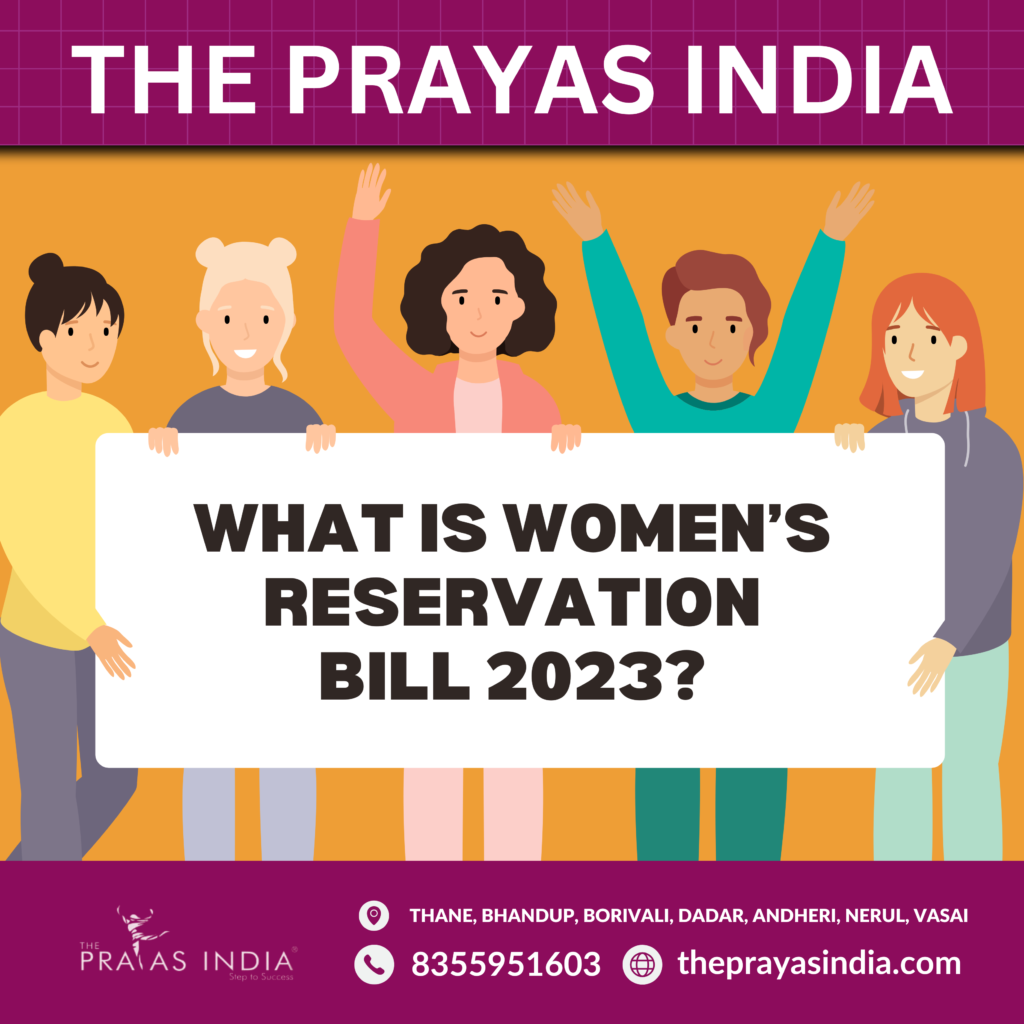INTRODUCTION: WOMEN’S RESERVATION BILL
The Women’s Reservation Bill, also known as the Nari Shakti Vandan Adhiniyam, 2023, was approved in the Lok Sabha on September 20th. This bill received strong support from the majority of MPs, with 454 votes in favour and only 2 votes against it. It was introduced by Union Law Minister Arjun Ram Meghwal during the opening session of the new Parliament.
This bill, formally named the Constitution (One Hundred and Twenty Eighth Amendment) Bill, 2023, aims to ensure that women have a 33% reservation in both the Lok Sabha and state assemblies. However, this reservation will only become effective in 2029 because it must be implemented after the process of constituency delimitation, which is set to occur following the next census, likely after the 2024 general elections.
In this article, we’ll explore the Women Reservation Bill, what is it, its historical background, the arguments supporting and opposing it, its Importance, and why it’s crucial for UPSC preparation. So let’s get started!

WHAT IS WOMEN’S RESERVATION BILL
- Bill Purpose: The Constitution One Hundred & Eighth Amendment Bill of 2008 aims to reserve one-third of seats in the Lok Sabha and state legislative assemblies for women.
- Allocation: Parliament will determine the authority responsible for allocating these reserved seats.
- Seat Allocation: Reserved seats for women can be rotated among different constituencies within states or union territories.
- Time Limit: Reservation of seats for women will be in effect for 15 years after the commencement of this Amendment Act.
- New Articles: The bill introduces two new articles:
- Article 330A: Reserves one-third of seats for women in the Lok Sabha, including one-third of seats for Scheduled Castes (SCs) and Scheduled Tribes (STs).
- Article 332A: Reserves one-third of seats for women in every state Legislative Assembly, including one-third of seats for SCs and STs.
- Delhi Legislative Assembly: A new clause in 239AA mandates the reservation of one-third of seats for women in the Delhi Legislative Assembly, including one-third of seats for SCs, as determined by parliamentary law.
BACKGROUND HISTORY
This important step is meant to address the unequal representation of men and women in politics and make sure more women have a say in making important decisions. You can read more here Women Reservation Bill. Now, let’s take a quick look at its history:
- 1996:
- Proposed as the 81st Constitutional Amendment Bill.
- Referred to a parliamentary committee chaired by Geeta Mukherjee.
- Lapsed due to lack of consensus on OBC women’s reservation.
- 1999:
- Reintroduced in 13th Lok Sabha.
- Reintroduced twice in 2003.
- All attempts failed to pass.
- 2004:
- The inclusion of the UPA’s Common Minimum Programme.
- Presented in Rajya Sabha to prevent lapsing.
- 2010:
- Passed in Rajya Sabha as 108th Constitutional Amendment Bil
- Lapsed in Lok Sabha.
- Opposition called for 33% reservation for backward groups within the 33% quota for women.
- 2014 & 2019 :
- Lok Sabha Polls
- BJP’s election manifesto in both 2014 and 2019 included a commitment to pass the Women’s Reservation Bill.
- 2023:
- Lok Sabha Polls
- In 2023, the Lok Sabha successfully passed the Women’s Reservation Bill.
ARGUMENTS IN FAVOUR OF THE WOMEN RESERVATION BILL
- Amplifying Women’s Issues: Higher female representation can lead to better discussion of women’s issues, addressing the existing gender disparities. India ranks low on the Global Gender Gap Index.
- Gender Gap Challenges: India ranks 127th out of 146 countries in the Global Gender Gap Index, with a projection of 162 years to close the gender gap in political empowerment.
- Affirmative Action Needed: Political parties in India tend to be patriarchal, making reservations necessary for fair female representation in Parliament.
- Panchayat Leadership Success: Women in Panchayat leadership roles have made substantial positive changes, including addressing social issues, controlling alcohol problems, investing in public welfare, and reducing corruption.
- Tackling Critical Challenges: Increased female participation in decision-making can help address issues such as rising crimes against women, skewed sex ratios, and low nutrition levels in various parts of the country.
ARGUMENTS AGAINST THE WOMEN RESERVATION BILL
- Equality Principle Concern: Opponents argue that women’s reservations contradict the principle of equality enshrined in the Constitution.
- Merit-Based Competition: They contend that not allowing women to compete on merit may negatively impact their social status.
- Limiting Voter Choices: Reserving seats for women in Parliament may limit voters’ choices to female candidates, reducing diversity in representation.
- Impact on Family Dynamics: Some argue that introducing more women into politics may disrupt traditional family dynamics where men hold primary power and key positions in politics, raising concerns about the “ideal family” concept
IMPORTANCE & UPSC NOTES: WOMEN RESERVATION BILL
The Women’s Reservation Bill is significant for several key reasons:
Gender Equality:
- It addresses the historical underrepresentation of women in politics, striving for gender equality.
- Symbolically, it underscores the importance of women’s contributions in shaping the nation’s future.
Empowerment:
- The bill grants women equal access to politics, breaking down traditional barriers.
- Through political participation, women develop leadership skills, serving as role models and influencing policies.
Diverse Perspectives:
- It brings attention to gender-specific issues often sidelined, leading to more balanced decision-making.
- Female political leaders challenge stereotypes and inspire social and cultural change, fostering inclusivity in society.
The Women’s Reservation Bill is crucial for UPSC aspirants as it:
- Relates to current affairs and constitutional knowledge.
- Addresses gender equality, a common UPSC topic.
- Impacts political science and governance studies.
- Is relevant for essay and interview discussions.
- Offers policy analysis opportunities.
- Provides insights into social dynamics.
CONCLUSION
In conclusion, the Women’s Reservation Bill carries significant relevance for UPSC aspirants. It goes beyond just being a current affairs topic or a constitutional amendment. It offers a valuable opportunity to delve into the complexities of gender issues, governance, and policy analysis — all crucial dimensions of the UPSC examination.
So, if you’re gearing up for the UPSC exam, we encourage you to explore this topic carefully. And remember, if you need guidance and counseling for your UPSC preparation, don’t hesitate to reach out. We’re here to provide you with free support and assistance on your journey to success. Wishing you all the best!




![Prayas-तेजस [UPSC CSE Sociology Optional] – Online & Offline](https://theprayasindia.com/wp-content/uploads/2025/09/Prayas-तेजस-UPSC-CSE-Optional-Subject-The-Prayas-India-300x300.png)
![Prayas-सूत्र [UPSC CSE Materials (Hardcopy)]](https://theprayasindia.com/wp-content/uploads/2025/09/Prayas-सूत्र-UPSC-CSE-Study-Materials-Hardcopy-The-Prayas-India-300x300.png)
![Prayas-मंत्रा [UPSC CSE CSAT]](https://theprayasindia.com/wp-content/uploads/2025/09/Prayas-मंत्रा-UPSC-CSE-CSAT-The-Prayas-India-300x300.png)
![Prayas सारथी [UPSC CSE One on One Mentorship]](https://theprayasindia.com/wp-content/uploads/2025/09/Prayas-सारथी-UPSC-CSE-One-on-One-Mentorship-The-Prayas-India-300x300.png)










